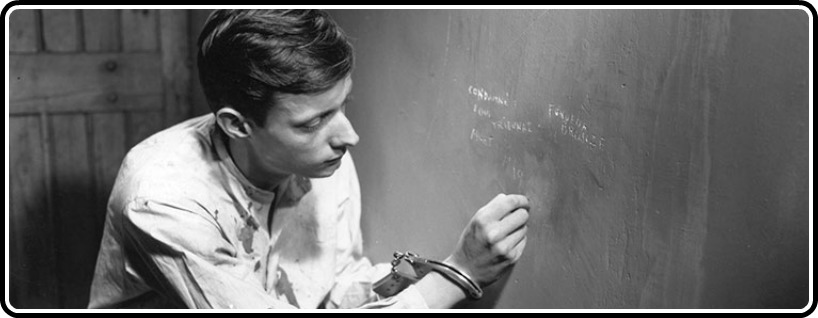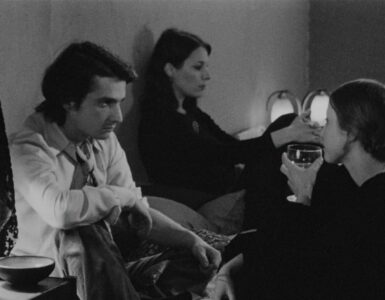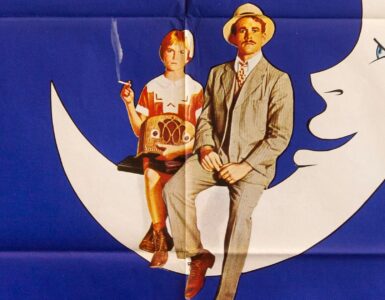Film is an inherently sense-centric medium. Be it the visual nature of the art form, or how a film’s soundtrack, sound editing and sound design add to its drama or its horror, its comedy or its suspense. The definitive multi-media art form, when a film blends the audio and the visual, it becomes a potent body blow to the senses. And very few films pack as big and devastating a punch as Robert Bresson’s deeply moving meditation on free will, A Man Escaped.
Made just three years prior to the auteur’s equally quiet Pickpocket, Bresson’s A Man Escaped would arrive over a decade after the birth of Italian neo-realism, and his picture would shatter even what those pictures would deem as true realism. Arguably a deeply cinematic dramatization of a man’s escape from a POW camp more so than an actual feature film, the picture tells the tale of a man trapped in a POW camp during WWII. Named Fontaine, we first meet our lead as he attempts to break free of his captors during his transportation to the camp, but from the very first sequence of the film, we see that Bresson isn’t simply telling us a single man’s story, but instead setting his narrative at a far loftier height.
The film’s first sequence is more than telling. Finding our lead in the throes of his (possibly) first attempt at freeing his captors, Bresson isn’t interested in the actual escape ultimately. Throughout the picture, Bresson is far more thrilled in engaging the audience in the idea on if the escape will not only work, but if it’s ultimately worth it. With the camera completely uninterested in following Fontaine as he leaves the car for his first escape, Bresson’s frame not only believes that he’ll return, but that it isn’t even worth questioning (dare I say it’s pre-determined).
Based on the memoirs of one Andre Devigny, the film’s aesthetic is decidedly natural, almost to a fault. Featuring still close-ups of faces and various tools Fontaine uses as crafts while in his cell, the film blends all-time great sound work from the team of Joseph Abjean, Pierre-Andre Bertrand and Guy Rophe, into a film that is so visceral raw that it almost becomes surreal. Dialogue is sparsely used, finding Bresson instead opting for a use of voice over that likely sat very heavy on the mind of Terrence Malick when that master first began his career, giving the film it’s only real sense of other-worldliness outside of the film’s inherent interest in discussing this man’s (an man’s in general) free will. However, the film is arguably one of the most purely cinematic films ever made.
Despite being simplistic stylistically, the film’s simplicity breeds its breathtaking sense of cinema. Bresson’s frame gives us tableau after stunning tableau, as proven by the stunning photograph that adorns the cover of Criterion’s newly released Blu-ray. Instead of using sweeping tracking shots or utilizing gaudy special effects, Bresson goes big in his themes, but pairing his meditative discussion of faith with black and white photography and a claustrophobic camera that is evoked in later day auteurs like director Lodge Kerrigan (whose films use natural direction and sound design to a similar extent).
Performance wise, the film is startlingly brilliant. Francois Leterrier is great here as our lead, and his face is as perfect a palette for Bresson to paint his story of existential angst. A perfectly quiet actor, his stubbornness and pure will are so heartbreaking that the film’s final act is thrilling, despite its silence. There is a determination that speaks to the human spirit, but Bresson’s lack of interest in giving this man any sort of break is telling. With sound design that plays as if the world around Fontaine is a weight of immeasurable size, footsteps outside his cell door echo, and voices reverberate throughout the halls.
And Criterion’s new Blu-ray is pitch perfect. For a film so focused on its own aesthetic, the audio and the visual transfer is stunning. The sound is great, and while I myself can’t discuss how it plays within a true surround sound system, its focus on the design of the film’s sound is potent. Leonce-Henri Burel’s photography is great, and Bresson’s camera comes to life in a new way with this Blu-ray. Loaded with supplements, Criterion’s Blu-ray is led by a pair of hour long documentaries on the director and his impact on the film world, an interview with the director from a 1965 French TV show and even a new visual essay, looking at the film’s sound design. The latter features writing from Kristin Thompson and David Bordwell, Bordwell’s work being an absolute must read for anyone interested in this picture.
Overall, this is yet another truly fantastic release from The Criterion Collection. Quite possibly Robert Bresson’s best film, A Man Escaped has more on its mind than just your average escape film. With its sight set on human nature, existential angst and free will, Bresson’s film is a masterpiece of the highest regard. Francois Truffaut put it best in his piece on the film following its release, saying that A Man Escaped is the first film of “utter bravura.” And then, even that may be putting it lightly.






![Bergman Island (The Criterion Collection) [Blu-ray]](https://criterioncast.com/wp-content/uploads/2022/11/bergman-island-the-criterion-collection-blu-ray-400x496.jpg)
![This Is Not a Burial, It’s a Resurrection (The Criterion Collection) [Blu-ray]](https://criterioncast.com/wp-content/uploads/2022/11/this-is-not-a-burial-its-a-resurrection-the-criterion-collection-blu-ray-400x496.jpg)
![Lars von Trier's Europe Trilogy (The Criterion Collection) [The Element of Crime/Epidemic/Europa] [Blu-ray]](https://criterioncast.com/wp-content/uploads/2022/11/lars-von-triers-europe-trilogy-the-criterion-collection-the-element-of-400x496.jpg)
![Imitation of Life (The Criterion Collection) [Blu-ray]](https://criterioncast.com/wp-content/uploads/2022/11/imitation-of-life-the-criterion-collection-blu-ray-400x496.jpg)
![The Adventures of Baron Munchausen (The Criterion Collection) [4K UHD]](https://criterioncast.com/wp-content/uploads/2022/11/the-adventures-of-baron-munchausen-the-criterion-collection-4k-uhd-400x496.jpg)
![Cooley High [Criterion Collection] [Blu-ray] [1975]](https://criterioncast.com/wp-content/uploads/2022/11/cooley-high-criterion-collection-blu-ray-1975-400x496.jpg)